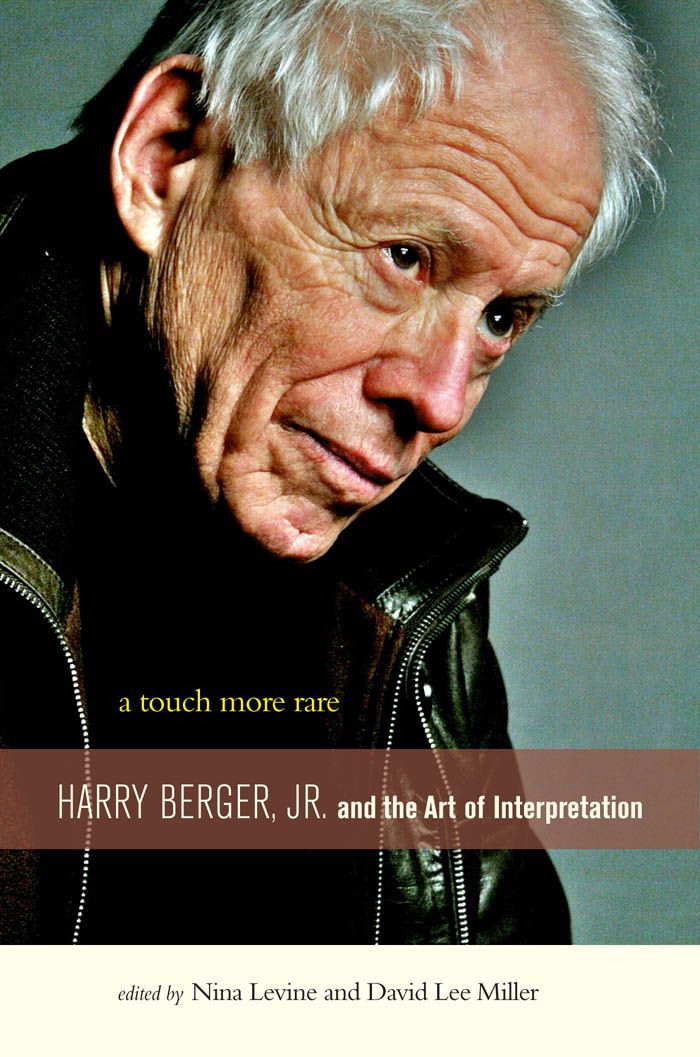A Touch More Rare
Harry Berger, Jr., and the Arts of Interpretation

This book can be opened with

Harry Berger, Jr., has long been one of our most revered and respected literary and cultural critics. Since the late nineties, a stream of remarkable and innovative publications have shown how very broad his interests are, moving from Shakespeare to baroque painting, to Plato, to theories of early culture.
In this volume a distinguished group of scholars gathers to celebrate the work of Harry Berger, Jr. To "celebrate," in Berger's words, is "to visit something either in great numbers or else frequently-to go away and come back, go away and come back, go away and come back. Celebrating is what you do the second or third time around, but not the first. To celebrate is to revisit. To revisit is to revise. Celebration is the eureka of revision." Not only former students but distinguished colleagues and scholars come together in these pages to discover Berger's eurekas-to revisit the rigor and originality of his criticism, and occasionally to revise its conclusions, all through the joy of strenuous engagement.
Nineteen essays on Berger's Shakespeare, his Spenser, his Plato, and his Rembrandt, on his theories of interpretation and cultural change and on the ethos of his critical and pedagogical styles, open new approaches to the astonishing ongoing body of work authored by Berger.
An introduction by the editors and an afterword by Berger himself place this festival of interpretation in the context of Berger's intellectual development and the reception of his work from the mid-twentieth century into the first decade of the twenty-first.
. . .Acknowledging the extraordinary, multidimensional work of Harry Berger Jr., and consists of a lively set of celebratory contemplations (more talks than essays) on his scholarly career.——Studies in English Literature, 1500-1900
The sections on theory and academic community, in particular, raise questions about the conduct of the profession itself, and this emphasis probably makes the book most useful to those who are interested in reassessing the place of these disciplines in the university and trying to discern future directions for humanistic research.——Choice
Somewhere in his innermost closet Harry Berger, Jr. must harbor the
——Stephen Greenblatt, Harvard University
secret of perennial freshness. For decades now his vitally important
work has conferred the power to see with new eyes familiar works of
literature, philosophy, and art, as if their innermost meanings were
being glimpsed for the first time. This fine connection of essays
captures the subtle flavor of Berger’s magical elixir of critical youth.
"Very few members of any profession have bestowed a touch more rare. . . Renaissance studies has been lucky to benefit from the precedents of this master mapmaker.——Renaissance Quarterly
After a half-century of ground-breaking, earth-shaking work, Harry Berger, Jr., certainly deserves this tribute: twenty essay that celebrate, contemplate, critique, and take flight from Berger's always generative criticism.——Margreta de Grazia, University of Pennsylvania
For more than half a century Harry Berger, Jr., has been producing
——Stephen Orgel, Stanford University
seminal work of astonishing depth and brilliance, thoroughly
interdisciplinary, massively learned, philosophically sophisticated;
but also mischievous, uninhibited, genuinely liberating. These essays
by students and friends celebrate and respond to one of the major
figures in American letters, whose work has significantly remade the
practice of cultural history. The volume is invaluable, a tribute and
guide to a protean body of work.

